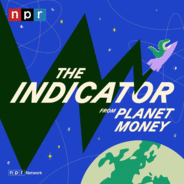Seemingly every celebrity has their own brand these days, whether it’s booze (Cameron Diaz, Matthew McConaughey) or cosmetics (Selena Gomez, Lady Gaga) or squeezy food pouches (Jennifer Garner). Today on the show, what is fueling the celebrity business bonanza? We hear from two legendary singers, Lisa Loeb AND John Legend, who are pursuing ventures outside of show business. Related episodes: The celebrity crypto nexus The Olympian to influencer pipeline (Apple / Spotify)For sponsor-free episodes of The Indicator from Planet Money, subscribe to Planet Money+ via Apple Podcasts or at plus.npr.org.Fact-checking by Sierra Juarez. Music by Drop Electric. Find us: TikTok, Instagram, Facebook, Newsletter. Learn more about sponsor message choices: podcastchoices.com/adchoicesNPR Privacy Policy

Wirtschaft
The Indicator from Planet Money Folgen
A bite-sized show about big ideas. From the people who make Planet Money, The Indicator helps you make sense of what's happening in today's economy. It's a quick hit of insight into money, work, and business. Monday through Friday, in 10 minutes or less.
Folgen von The Indicator from Planet Money
300 Folgen
-
Folge vom 14.08.2025Why every A-lister also has a side hustle
-
Folge vom 13.08.2025Why Trump's spending bill could close your grocery storeTrump’s tax and spending law makes the largest cut in history to one of the nation’s biggest safety net programs. Today on the show, we explore how cuts to the Supplemental Nutrition Assistance Program, also known as SNAP, impacts families and grocery stores alike. Based on the digital story: Independent grocery stores have had a tough five years. SNAP cuts will make it harderRelated episodes:Do work requirements help SNAP people out of government aid? When SNAP Gets Squeezed The trouble with water discountsFor sponsor-free episodes of The Indicator from Planet Money, subscribe to Planet Money+ via Apple Podcasts or at plus.npr.org.Fact-checking by Sierra Juarez. Music by Drop Electric. Find us: TikTok, Instagram, Facebook, Newsletter. Learn more about sponsor message choices: podcastchoices.com/adchoicesNPR Privacy Policy
-
Folge vom 12.08.2025The arduous system for getting aid into GazaInsulin needles. Sleeping bags. Nutella. These are items Arwa Damon’s charity — International Network for Aid, Relief and Assistance — has tried to send to Gaza and Israel has rejected. It’s a glimpse into the harsh reality of a humanitarian crisis with no end in sight. Today on the show, we talk to Damon about the economics of running a humanitarian nonprofit and what’s stopping more aid from reaching Gaza. Related episodes: Why Israel uses diaspora bonds Why the U.S. helps pay for Israel’s military What could convince Egypt to take Gaza’s refugees? For sponsor-free episodes of The Indicator from Planet Money, subscribe to Planet Money+ via Apple Podcasts or at plus.npr.org. Fact-checking by Sierra Juarez. Music by Drop Electric. Find us: TikTok, Instagram, Facebook, Newsletter. Learn more about sponsor message choices: podcastchoices.com/adchoicesNPR Privacy Policy
-
Folge vom 11.08.2025What we're reading on the beach this summerIt's time for our annual beach reading recs. Today we bring you three books, with a little economic learning to boot. Our recs: Who is Government? The Untold Story of Public Service edited by Michael Lewis El Dorado Drive by Megan Abbott Algospeak: How Social Media is Transforming the Future of Language by Adam Aleksic Related episodes: Beach reading with a side of economics How to beach on a budget For sponsor-free episodes of The Indicator from Planet Money, subscribe to Planet Money+ via Apple Podcasts or at plus.npr.org. Fact-checking by Sierra Juarez. Music by Drop Electric. Find us: TikTok, Instagram, Facebook, Newsletter.Learn more about sponsor message choices: podcastchoices.com/adchoicesNPR Privacy Policy
